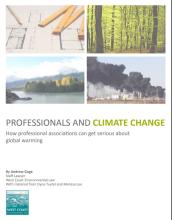
Increasingly, Canadians look to professionals – individuals with special expertise and training, such as biologists, engineers, planners and foresters – to make decisions about a wide range of issues. Climate change is a cross-cutting issue that affects advice and decision-making in many different professions to an increasing degree. From architects and engineers advising in the construction of a factory that will produce greenhouse gases, to professional foresters or biologists advising on the long-term survival of a forest ecosystem type, professionals are advising clients on climate change and its implications.
However, despite the work being done by professionals on the ground in terms of responding to climate change, there has been little discussion of the professional obligations related to this work. Professional associations, often created by government, govern the activities of their members through codes of conduct and ethics, standards of practice, requirements for continuing professional development, policy statements, and other guidelines. What do these rules say about climate change?
Given the important role of professionals in helping individuals and society at large respond to climate change, and to prepare for its impacts, professional associations should be very explicit about how their members are expected to act when dealing with climate change.